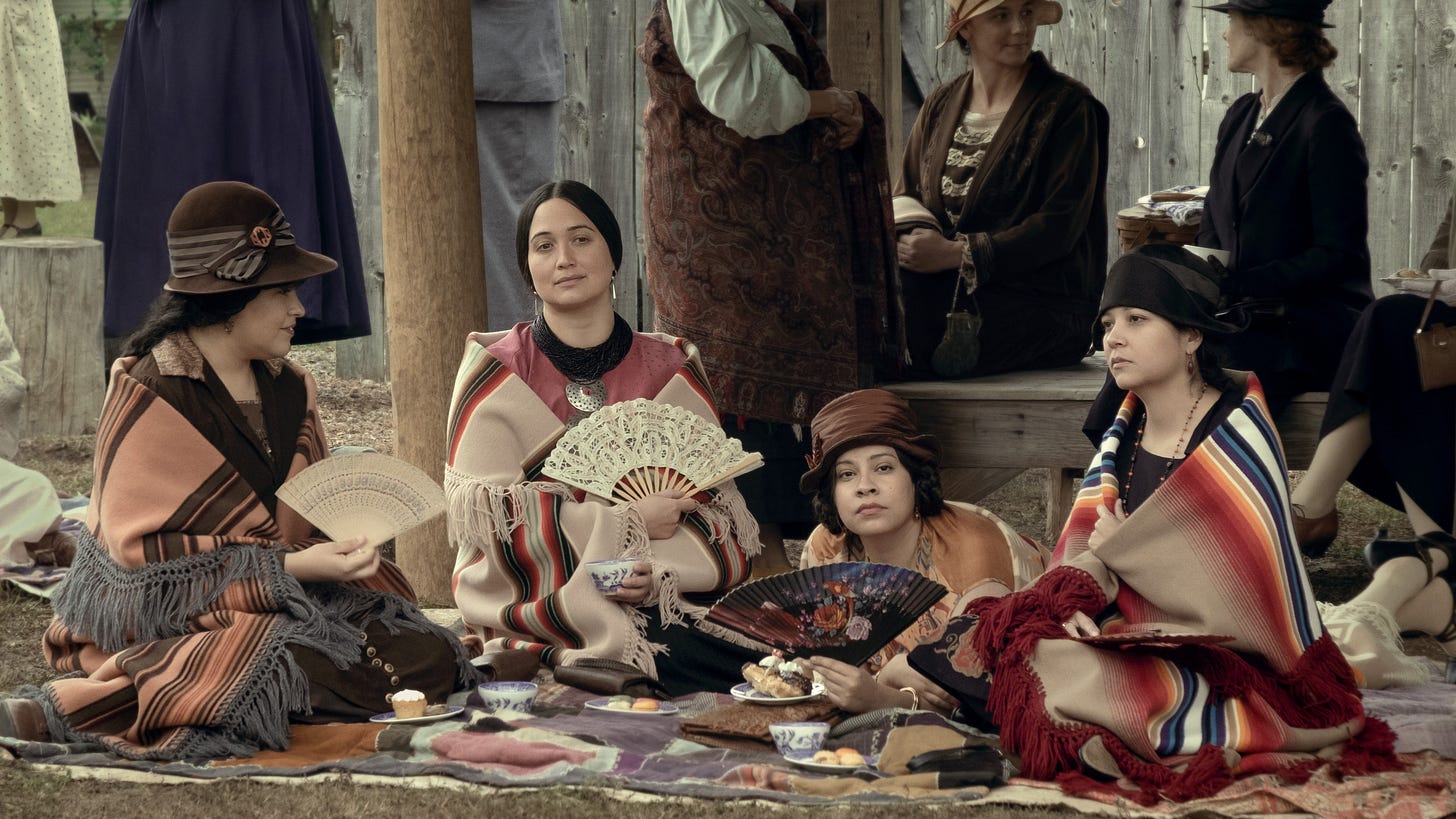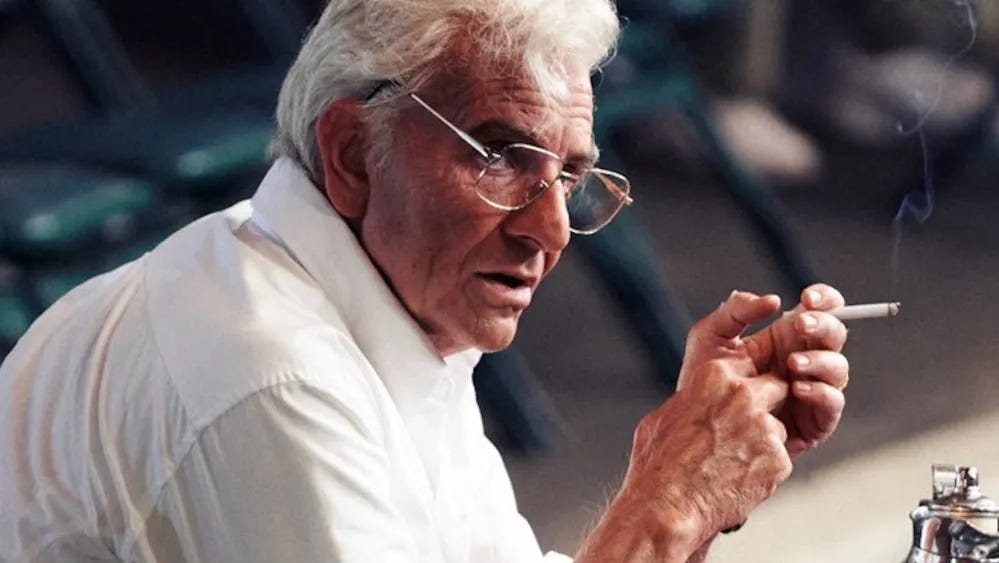War, Election Year & Awards Season: Oh My!
The perfect storm of foot-in-mouth moments likely in our near future

Welcome to Prestige Junkie, a new awards season newsletter from veteran film journalist Gregg Kilday that runs now through the Oscars. Also this week: our new Art + Crafts podcast debuts in two days.
Think that with a promising, eclectic lineup of films at the starting gate the 96th Academy Awards will be smooth sailing? Think again.
Heading into awards season, the Oscars might look as if they are in the best shape they’ve been in for years. A new producing team, headed by Raj Kapoor and Katy Mullan, was named in October, giving them plenty of time to prepare for ABC’s March 10 broadcast. Jimmy Kimmel, who’s been a reliable host, has been tapped to return for a fourth gig. The current Academy leadership under Bill Kramer and Janet Yang have proven more adept at messaging and tamping down controversies when they do inevitably crop up than the organization’s previous leadership. There’s a couple of summer blockbusters expected to be in the mix — Barbie, bringing lots of upbeat, candy-colored energy, and Oppenheimer, ensuring some real gravitas — which should lure in more fans and boost ratings. And with the writers and actors strikes settled, Hollywood is back in the business of self-promotion.
But the early indications suggest that, despite all that, this awards season could be a fraught, contentious and complicated affair that’s likely to be exceptionally tricky and difficult to navigate.
That became clear at one of the season’s first events, the New York-based, indie-centric Gotham Awards where the biggest news of the night was not that a delicate little film like Celine Song’s Past Lives won the top award, but that Robert De Niro monopolized the headlines by blasting Donald Trump and calling out Apple, which financed the $200 million Killers of the Flower Moon in which he stars, for allegedly attempting to censor his speech (don’t forget the Jon Stewart-Apple-China fiasco a little while back also). When his prepared remarks failed to show up on the teleprompter — it was later blamed on a miscommunication over which version of his remarks to load — an incensed De Niro read from his phone, “The former president lied to us more than 30,000 times during his four years in office. And he’s keeping up the pace in his current campaign of retribution.”
In turn, Trump, taking a break from his busy schedule of running for president and upending democracy, shot back in a Truth Social post, saying of De Niro, in part, “He has become unwatchable both in movies, and with the FOOLS that destroyed the Academy Awards, bringing them from one of the top shows in the Country to a Low Rated afterthought.” Hardly, the sort of publicity that the Academy, or, say, an awards-seeking streamer, is seeking.
Of course, that could all be dismissed as De Niro, a long-time Trump critic, just being De Niro. But it actually speaks to the highly polarized politics of this particularly toxic moment, which has managed to eclipse even earlier iterations of our polarized politics (see: 2022, 2021, 2020… and so on). All of which, for this particular industry, threaten to overshadow our own local elections — a.k.a. the Oscars — and could ultimately eclipse awards season.
Earlier this year, the Oscars pretty much managed to avoid overt politics, while also increasing its audience. But by March 2024, the highly divisive currents in play may make that impossible.
The Israel-Hamas war already has been a minefield for celebrities. Some of those tweeting support of Palestine have been accused of antisemitism, while some of those siding with Israel have been accused of endorsing genocide. Agent Maha Dakhil stepped aside from her role as co-head of CAA’s motion picture department after endorsing posts — since deleted and apologized for — accusing Israel of genocide. Spyglass Media Group dropped actress Melissa Barrera from Scream 7 after her Instagram stories were deemed antisemitic — she followed up with a post, saying, “First and foremost I condemn antisemitism and Islamophobia. I condemn hate and prejudice of any kind against any group of people.” United Talent Agency parted ways with Oscar winner Susan Sarandon after remarks she made at a pro-Palestinian rally in New York also were called antisemitic. Apologizing several days later, she issued a statement saying her “phrasing was a terrible mistake as it implies that until recently Jews have been strangers to persecution, when the opposite is true.” And The Morning Show’s Julianna Margulies had to do a quick about-face of her own after she was charged with racism because of a podcasts in which she questioned Black (and LGBTQ+) support of Jews.
Passions have become so heated that the Writers Guild, unlike other industry unions, failed to issue a statement condemning the Hamas attack because as WGA West president Meredith Stiehm explained in an email to members, “Like the membership itself, the board’s viewpoints are varied, and we found consensus out of reach.”
Meanwhile, frequent demonstrations calling for a cease-fire or protesting antisemitism have surrounded public events. Pro-Israeli and pro-Palestinian demonstrators clashed last month outside Los Angeles’ Museum of Tolerance when it held a private screening of graphic video showing the Oct. 7 attack on Israel. And though street closures in Hollywood will prevent demonstrators from getting anywhere near the Oscars themselves, the many preliminary events on the way to the Oscars could face added security issues.
If that’s not enough, concurrent to the war, that pit in your stomach is likely at least partly because of the presidential election year approaching, a rematch of unpopular candidates that will reach fever pitch during awards season. Super Tuesday (taking place on March 5, just a week before the Oscars) could crown Trump as the Republican nominee and also reveal if there are any legitimate challengers to President Biden. With tensions high, awards contenders will be tempted to speak out as they walk the red carpet and take to the podium at precursor events. And while Kimmel, who hasn’t shied away from taking on Trump and his supporters on his own show, may have avoided Trump last time out when the biggest question was how he would address the previous year’s notorious Slap, can he hold his tongue this time around?
Those precursor events themselves present added challenges. After weathering assorted scandals and being dropped by NBC, the Golden Globes on Jan. 7 moves to CBS and Paramount+. A-list stars will have to decide whether to lend their presence to a show that’s very much on probation (but in our addled short-term memories, will anyone remember?).
The Feb. 24 Screen Actors Guild Awards, streaming live on Netflix, will no doubt provide a platform for the union’s leadership to take a victory lap, but can they do that without casting shade on the studios and streamers they just spent 118 days battling?

And given the consciousness that’s been raised in the wake of the #MeToo and Black Lives Matters movements, the movies that will be contending for honors will also be drawn into the fray. Already, there have been complaints in some quarters that Barbie is anti-male, that Oppenheimer should have shown the devasting destruction of Hiroshima and Nagasaki, and that Killers of the Flower Moon gives short shrift to the point of view of the Osage Nation. Even before Maestro debuted in Venice, there was a fuss over Bradley Cooper’s prosthetic nose, which led to a debate over whether non-Jewish actors should be cast in Jewish roles. (And oy! He is maybe dating Gigi Hadid!) Now, those are the kind of complaints that usually circulate in the form of 11th-hour whisper campaigns attempting to knock a leading picture off its perch, but this year they’ve been front and center from the very beginning.

Of course, that has given awards hopefuls time to refine their talking points. But you can be sure that this year, their minders will be ushering their charges extra quickly along the press lines unless a stray comment leads to an explosive viral moment, and q-and-a moderators will feel extra pressure to control the conversation and keep problematic questioners at bay.
In short, the road to the upcoming Oscars, looking especially precarious, is full of potholes that could trip up the unwary. And if contenders get mired down in any of those potential controversies along the way, that could impact the Oscar show itself. Because how do you grow an audience, if alienated viewers tune out before the curtain even goes up?
Reach out to me at Gregg@theankler.com.
To sponsor Prestige Junkie, reach out to London@theankler.com.




It's great to see you writing again, Gregg!